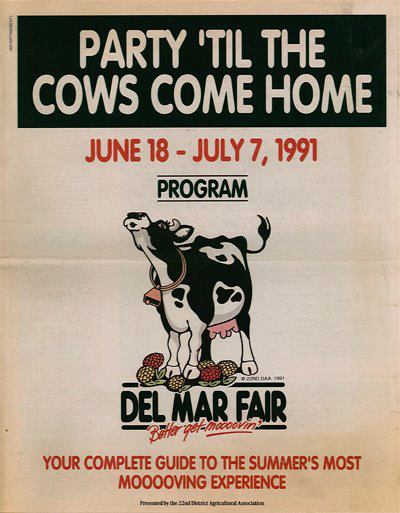June 27, 1991
AL HIRT
CHARLEY PRIDE
CHEAP TRICK
ENGELBERT HUMPERDINCK
FREDDIE JACKSON
JOE SAMPLE
JOHN DENVER
LINDA RONSTADT & LOS CAMPEROS DE NATI CANO
LOS LOBOS
MARIACHI LOS CAMPEROS
MELISSA MANCHESTER
NEVILLE BROTHERS
RALPH TRESVANT
RESTLESS HEART
TAKE 6
TANYA TUCKER
TEXAS TORNADOS
TITO PUENTE
TONY! TONI! TONÉ!
TOWER OF POWER
VINCE GILL
WHISPERS
location: "Del Mar Fair" Grandstand Stage
place: San Diego, CA
country: USA

MUSIC REVIEW : Tornados Whip Up a Good Time : Concert: Tex-Mex band's mix of Norteno, country and rock 'n' roll takes Del Mar Fair by storm.
June 29, 1991 | JOHN D'AGOSTINO | SPECIAL TO THE TIMES
DEL MAR — All-star music groups composed of strong, individualistic artists confront two possible fates.
In the unfortunate scenario, a "supergroup" contracts Mt. Rushmore Disease and eventually strains under the weight of its combined "heaviosity," a la Crosby, Stills, Nash, and Young.
The more serendipitous script has disparate musicians effecting a subtle linkage that produces an enjoyable, collective alter ego, as with the masters of ad hoc, the Traveling Wilburys and the Highwaymen.
Add to that latter category Texas Tornados, who blew into town Thursday night and left a few thousand satisfied fans strewn behind at the Del Mar Fair. The Tornados feature guitarist Doug Sahm, keyboardist Augie Meyers, guitarist Freddy Fender and button-accordionist Santiago (El Flaco) Jimenez.
These guys came with credentials.
Sahm and Meyers co-founded the Sir Douglas Quintet, which had pop hits in the '60s with "She's About a Mover" and "Mendocino." Fender nailed the country-Western charts in the '70s with "Before the Next Teardrop Falls" and "Wasted Days and Wasted Nights." Jimenez is a legend of conjunto, the polka-derived music indigenous to the conjoined region of south Texas and northern Mexico.
Together, the quartet released a self-titled album last year that was supposed to be a onetime lark. Instead, "Texas Tornados" won a Grammy and has remained on the country charts for 44 weeks, selling 250,000 copies. The project has assumed a life of its own, and it was obvious in the band's performance at the Grandstand Stage that the musicians are a little giddy from the unexpected turn of events.
Besides the main foursome, the Tornados' traveling band consisted of a drummer, a bassist, and an electric guitarist. Oscar Tellez, who plays bajo sexto (bass-chordal guitar) in Jimenez's conjunto band, contributed acoustic rhythm guitar and vocals. If you're counting, that's four guitarists playing at any one time. Yet, for its apparent cumbersomeness, the octet made some very pleasant, coherent noise.
Like its album, the Tornados' concert coalesced ingredients from each of the players' musical pantries and whipped them into a Tex-Mex froth. In fact, most of the song list was taken from the Grammy-winning recording, beginning with the Sahm-sung "What Were You Thinkin' Of". The audience's enthusiastic response to that song's peppery eighth-note rhythm, and later to Sahm's galloping "Adios Mexico," afforded one a clear perspective on the fundamental appeal of Tex-Mex's mix of Norteno, country, and rock 'n' roll.
In almost repertory fashion, the other Tornados checked in with their respective specialties. Fender was in good voice on the country-ish ballad "If That's What You're Thinking" and on a new tune (from the band's next album, due in September) that featured the South American cumbia rhythm, which is essential to both conjunto and salsa music.
Fender's renditions of "Before the Next Teardrop Falls," "Wasted Days and Wasted Nights," and "Tell It Like It Is" (the last being a gutsy choice considering Aaron Neville's definitive 1966 version) drew hoots of approval, as well.
The bearded Meyers, a musician of modest skills and dry wit, unofficially (and, perhaps, unintentionally) represents the group's comic relief. Playing a Sir Douglas Quintet-vintage Vox Continental organ (and, occasionally, a regular accordion), he kept things light with his deadpan reading of "Dinero" ("If you got the dinero, I got the Camaro") and a rollicking version of his "(Hey Baby) Que Paso" that elicited a hearty cheer of recognition.
Jimenez, whose bright, reedy fills and embellishments on the button accordion carbonated the band's locomotive gait, was featured on a couple of fast-paced conjunto tunes that had the standing-room-only crowd directly beneath the stage dancing en masse. In a concert characterized by effervescent fun, Jimenez also introduced a note of poignancy when he performed the Tornados' encore, "Soy de San Luis," which was written by his late father, a conjunto pioneer.
The Tornados' critical and popular acceptance represents something of a recompense for Sahm, who championed Tex-Mex for many years before it was taken seriously by more than a handful of loyalists. There was a perceptible note of triumph in his performance of the '60s hits "Mendocino" (which Sahm claimed was first aired with any regularity by San Diego deejay Jimmy Rabbit) and "She's About a Mover," on which Meyers' cheesy organ figure emulates a conjunto accordion part.
His union with other strong personalities should also serve to submerge Sahm's rampant ego and temper a proclivity toward clownish behavior that makes him the Jerry Lewis of Tex-Mex. But the Tornados' current success--of which a chronically hoarse Sahm loudly reminded the audience at regular intervals--seems to have given a green light to some of Sahm's worst tendencies. His goofy dancing during Jimenez' first spot was annoyingly distracting, and a host of other look-at-me antics proved the concert's only bruises.
Sahm redeemed himself somewhat with an engaging performance of the album's graceful, mid-tempo ballad, "Laredo Rose," and with show-closing covers of two '60s hits and the Mysterians' 1966 smash, "96 Tears" and Sam the Sham and the Pharaohs' 1965 gold mine, "Wooly Bully"--that exposed those tunes' Tex-Mex roots.